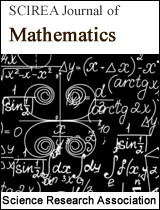Two New Approximants for the Error Function
DOI: 282 Downloads 14641 Views
Author(s)
Abstract
In this paper, we present two new approximants for the Error Function. The starting point for obtaining them, is to use two alternative integral representations involving improper integrals. Both integrands include the function. Therefore, by replacing by its truncated Taylor's expansion, we obtain a rational approximant for which converges, for each x, to that function. Since these Taylor polynomials have simple roots, the improper integrals can be evaluated with the residues technique of integration in the complex plane, by using an appropriate contour of integration. By just using the roots of the polynomials, we get two new analytical expressions for the Error Function in terms of elementary functions. We show the behaviour of their corresponding errors by giving practical bounds for the absolute and relative errors, respectively.
Keywords
Error function, Complimentary Error function, residues, contour of integration, rational approximant, oscillating integrand, Integral representation, Boys function
Cite this paper
D.G. Zaccari, C.J. AlturriaLanzardo, J.E. Pérez, J.C. Cesco,
Two New Approximants for the Error Function
, SCIREA Journal of Mathematics.
Volume 4, Issue 4, August 2019 | PP. 104-114.
References
| [ 1 ] | Boas M.L., Mathematical Methods in the Physical Sciences,3rd ed. John Whiley & Sons, Inc. USA (2006). |
| [ 2 ] | Edward W. Ng, Murray Geller, A Table of Integrals of the Error Functions, JOURNAL OF RESEARCH of the National Bureau of Standards - B. Mathematical Sciences, Vol. 73B, No. 1, January-March 1969 |
| [ 3 ] | M. Mori, A Method for Evaluation of the Error Function of Real and complex Variable with High Relative Accuracy, Pub. RIMS, Kioto Univ., Vol. 19, 1081-1094 (1983). |
| [ 4 ] | J.C. Cesco, J.E. Pérez, C.C. Denner, G.O. Giubergia, A.E. Rosso, Rational Approximants to evaluate four-center repulsion integrals for 1s hydrogen Slater type functions, Applied numerical mathematics, vol 55, Issue 2, 173-190 (2005). |
| [ 5 ] | S. Särkkä, R. Piché, On the convergence and accuracy of state-space approximations of squared exponential covariance functions, 2014 IEEE INTERNATIONAL WORKSHOP ON MACHINE LEARNING FOR SIGNAL PROCESSING, Sept. 21-24, 2014, REIMS, FRANCE. |
| [ 6 ] | S.F. Boys, Electronic wave functions, Proc. R. Soc. (1950) A200, 542. |
| [ 7 ] | J.E. Pérez, O.E. Taurian, J.C. Cesco, A.E. Rosso, C.C. Denner,C.J. Alturria Lanzardo, F.S. Ortiz and A. Bouferguene, A Basis Set Composed of Only 1s Slater Orbitals and 1s Gaussian Orbitals to Perform Molecular Calculations, SCF-LCAO Approach, Advances in Quantum Chemistry, Vol 67, Elsevier, 2013, p. 55-64. |
| [ 8 ] | J.E. Pérez, J.C. Cesco, C.J. Alturria Lanzardo, D.G. Zaccari, F.S. Ortiz, A.T. Soltermann, P. E. Hoggan, Considering a mixed atomic basis set composed of only 1s STO and 1s GTO in molecular calculations, Chemistry Research Journal, 2019, 4(1):60-66. |

